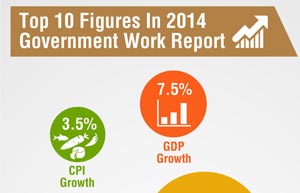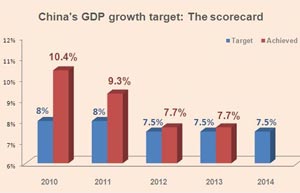No pain, no gain for China's reformers
Updated: 2014-03-31 07:50
By Ed Zhang (China Daily)
|
||||||||
Squeezing those excesses out of the market is a necessary move to detoxify the rest of the economy. Most importantly, it will force the banks to reorganize their business.
This can't be called an austerity program, because we're talking about a long, slow process without a crash. Nor, certainly, is it quantitative easing. It is a deleveraging campaign.
|
 Premier calls for financial innovation |
|
 |
Getting those results has taken a GDP growth rate of less than 8 percent from the first quarter of 2012 to the fourth quarter of 2013.
If China can, in two more years of still lower growth (GDP expansion of 7.5 percent or less), it can reasonably hope to phase out a significant part of its old-economy industries.
And if, as some business commentators propose, the country is to eliminate up to half of its industrial base to make way for business based on the mobile Internet, it will have to keep the credit line really tight for local development projects.
The central government has declared that it will build a municipal bond market. But the period from passing laws and regulations to witnessing a functioning market could be at least two years.
It will take at least as much time to establish a credit rating system just at the city government level. To extend the system to all local governments, from the provincial level down to the township level, will require a much larger and longer effort.
So, with perhaps only a few exceptions, local governments will face a long period of tight credit. Many mayors and other officials will find it hard to achieve their development goals before their terms expire. Their most ambitious projects will be starved of funding.
People traveling to Haikou, Hainan province, and Beihai, in the Guangxi Zhuang autonomous region, can still see some "rotten-tail" (unfinished) buildings from property booms in the 1990s.
A boom cut short can leave nearly permanent scars on a city. There will probably be more cities in just that situation a few years from now.
Just as the central government has never helped Haikou and Beihai rebuild, it is all up to local governments to redirect their development path.
|
 |
 |
- On reform, China needs to 'keep peddling': expert
- Premier urges capital market reforms
- The road to public finance reform
- China needs reforms for inclusive growth: Lagarde
- China should manage reform tradeoff, implementation
- China's reform fosters new growth impetus: vice premier
- Reforms give NGOs a level playing field

 World's tallest ferris wheel opens in Las Vegas
World's tallest ferris wheel opens in Las Vegas
 Did we get ya? Happy April Fools' Day!
Did we get ya? Happy April Fools' Day!
 Meet the crew of the drama of Green Snake
Meet the crew of the drama of Green Snake
 Students compete in Chinese competency
Students compete in Chinese competency
 Chinese, Belgian heads of state launch panda house
Chinese, Belgian heads of state launch panda house
 New British royal family photo released
New British royal family photo released
 Xi watches China-Germany youth football match in Berlin
Xi watches China-Germany youth football match in Berlin
 Participants run for color
Participants run for color
Most Viewed
Editor's Picks

|

|

|

|

|

|
Today's Top News
New iPhone 6 screens to enter production as early as May
We should join hands,
Xi tells EU
Ukraine sees troop pullback
Urgent hunt for black box
China calls for calm on Koreas
Chinese investors in US
Village elects new leadership in wake of scandals
Former senior military officer faces graft charge
US Weekly

|

|







